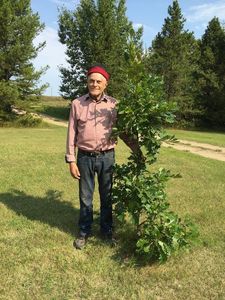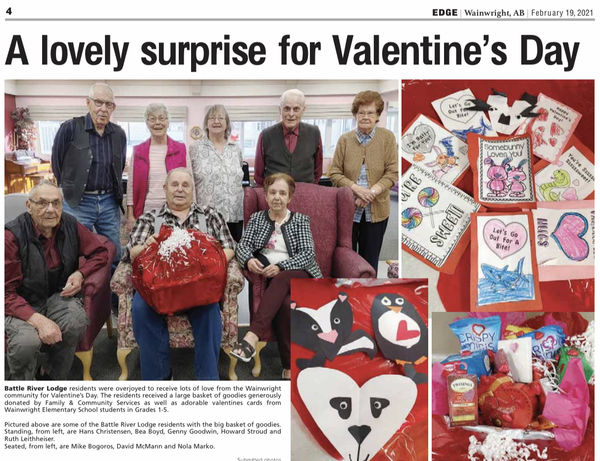The Legend of Howard Stroud
By Lorrie Potvin
Sometimes when I’m feeling sad or needing inspiration I think of Howard. I met Howard in 2016 when I travelled out west to research the family homestead and to walk the same land my mother did as a child. I had his permission to record our conversation and I’ve let his words stand making this post a little longer than usual.
Garbed in jeans and runners, and wearing a red toque better suited to winter, Howard was on a vintage tractor tearing up a small plot with a vicious looking set of augers when I pulled up to his yard. When he saw me, he shut the tractor off and with a couple of lengthy strides he was in my space with a smile and an outstretched hand. I took it.
He didn’t know my family, but eager for a chat, he swept his arm across the expanse of his property towards the tracks and told me, “This used to be where the station house for the railroad stood. Right here is where people would wait for the train or get off the train. There used to be 30 or more houses here in Heath at one time on both sides. There were stores and shops and grain elevators. There’s nothing left now.”
His home was a cream-coloured, jumbled two-story structure trimmed in vibrant burgundy. He pointed beyond it towards the east. “And this was the non-denominational church. They had summer school here every year, a bible camp.” I followed as he strode across the deep green grass of the side yard. He bent and pulled back grasses and vines to reveal the side of a square flat slab. “This here is the foundation for the girl’s dorm, and back there is the boy’s dorm. I think they had 40 or 50 come every year.”
The distance between dormitory slabs was less than ten yards. I imagined kids making furtive plans, quietly passing notes, whispers setting up midnight trysts.
“How did you come to live here?”
“I bought this place from Wylie and there was this old foundation, so I just put a roof on it. I had it all fixed up inside. It was nice, and the south end was glass. And then I had a propane tank, and it had a thousand gallons of propane in it, and I bought a valve to fix the furnace and get all new parts in it. And here it was a faulty valve they did a recall on. And they chose rather to pay the death claims than do the recall in the States. And filled the basement up with a thousand pounds of propane and then she blew up. I went to light the furnace and the roof went up in the air and blew the walls out and there was no more of anything. And I had a garage here, and I got out and I laid here until my clothes burned off and then I came to. And I walked out of the fire and went over to Jim’s and there was nobody home, so I crossed, went over the track there to go over to Ed. There was a train there and I crawled over the knuckle. I wanted to crawl underneath, but I thought my luck was too poor, so I crawled over the knuckle and my hands were all . . . the skin was just hanging, and it stuck on the, it was -22, stuck on the car. I got over to Ed’s and I knocked on the door with my foot. He came and went into shock. And I said to him, ‘Would you please drive me into Wainwright and have your wife phone the hospital.’ Eventually I said I got to get out of here because of the heat in the house. So, he come out and we got into his old truck. He put her in gear, and I said, ‘Ed maybe you should unplug it first.’” Howard laughs at this remembrance. “So, he got out, unplugged it and away we went, and he was drivin’. I says, ‘Ed I appreciate you going this fast, but I’d rather you slow down so we get there.’ So, he slowed down and you know he was in shock. And we got to the hospital, I walked in and the nurse she saw me, and she went in hysterics.”
“How long were you in the hospital?”
“Forty days. Cause I was burnt right to the bone here.” Howard held out his hands and twisted his arms to show me the scarring. “See there’s no veins there. They come down the side afterwards. Then my fingers started going like this.” He shaped his fingers into claws. “You can see how they pulled in. So, I had to keep every two hours stretching them back. Took me about two years to get going, to get my body back into working order.”
“What did you work at?”
Your CanLit News
Subscribe to Open Book’s newsletter to get local book events, literary content, writing tips, and more in your inbox
“Well, I was doing carpenter work then for the Flagstaff Municipality, but I moved houses for 18 years. And I was taking a massage course then, I had a year in, so I could work on my own hands. And then I got another year and finished my course, and that’s what I did for about 12 years.”
“Massage therapy?”
“Yup. And my wife, I met her after I got burnt. So that was the Cinderella story. And, uh, we lived here for 20 years, like in Wainwright and here. And in 2015, March the third, she came out of the house, and I was just building this wall.” He pointed to the retaining wall that was the start of the concrete steps we used earlier. “She said, ‘There’s gas in the house,’ and I said, ‘gas in the house?’ She said ‘yeah’, and I said, ‘I don’t think so because there’s nothing burning.’ She said, ‘I passed out and ended up on the cement walk.’ So, we took her to the hospital and the third trip they found out she had a massive brain tumour, right from here, right down here.” Howard used his scarred hand to shadow the side of his head. “So, she lived for three months. She said we had 20 years together. So, this is where we lived, and this is it.”
“Her spirit is here?”
“Yeah. It’s very nice because we did everything together and uh, you know people say, ‘why don’t you move away?’ Well, why would I want to move away? I want to be here where she was. We did this together, so . . .” Howard shrugged, “That’s it.” His jaw quivered, eyes softened.
I asked if I could take his picture. He nodded and walked over to a small oak tree that his wife Dawn planted in their front yard. “She ran over it with the riding mower a couple of times. It got shredded a bit, and after one winter it’s leaves never came back for a whole year.” Howard puts his arm out around it. It’s only slightly taller than him.
My eyes moistened and I gratefully hugged the legend of Howard Stroud for his life, his story, his sharing.
* * *
The views expressed in the Writer-in-Residence blogs are those held by the authors and do not necessarily reflect the views of Open Book.
Tradeswoman, artist, writer, and teacher Lorrie Potvin, a queerishly two-spirited Métis, is the author of Horses in the Sand: A Memoir. Her first book, First Gear: A Motorcycle Memoir and the essays "My tattoos speak of life and loss" and "Why I’m thankful for multiple sclerosis" (The Globe and Mail), were published under her previous surname Jorgensen, as was the short story, "The 13th Dock" in Writing At Wintergreen, an anthology edited by Helen Humphreys.
Working and teaching in the trades for over 30 years, Potvin holds an Inter-Provincial Red Seal in Auto Body Repair and Refinishing from Algonquin College and a diploma in Technological Education from the Faculty of Education, Queen’s University, with additional qualifications in Manufacturing and Special Education. A citizen of the Métis Nation of Ontario, Lorrie lives on a lake north of Kingston in the area served by the High Land Waters Métis Council where she’s lived for 30 years, building her home and creating art made of stone, wood, hide and steel.





